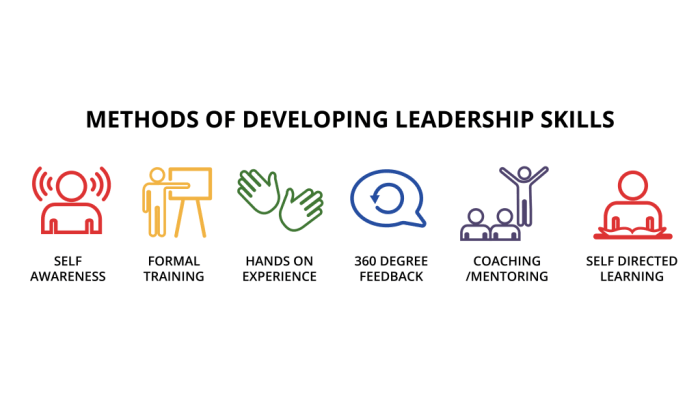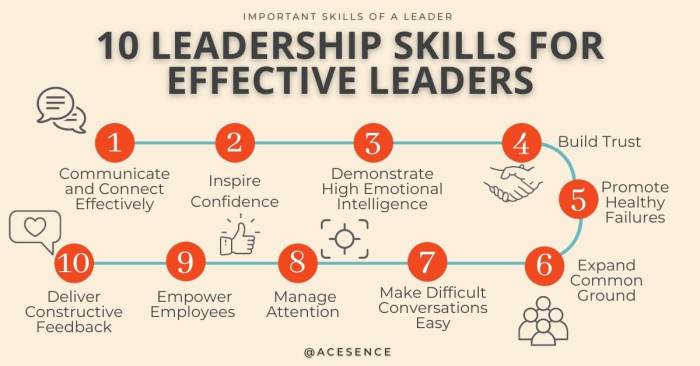Developing Leadership Skills is like unlocking a hidden superpower in a world full of potential. It’s about honing your abilities to inspire, guide, and lead others towards success.
Introduction to Developing Leadership Skills
Leadership skills are essential qualities that enable individuals to guide, motivate, and inspire others towards a common goal. These skills are crucial in various aspects of life, including business, education, sports, and community involvement. Effective leaders possess the ability to communicate effectively, make strategic decisions, and foster teamwork among team members.
Examples of successful leaders such as Mahatma Gandhi, Nelson Mandela, and Steve Jobs demonstrate the impact of leadership skills on their organizations or communities. Gandhi’s ability to lead India to independence through nonviolent resistance, Mandela’s role in ending apartheid in South Africa, and Jobs’ innovative leadership at Apple showcase how strong leadership skills can drive positive change and success.
It is important to differentiate between leadership traits and leadership skills. While traits are inherent characteristics that individuals possess, such as charisma or empathy, skills are developed through learning and experience. Leadership skills can be cultivated and honed over time through practice, training, and mentorship, allowing individuals to become effective leaders in their respective fields.
Types of Leadership Skills

Effective leadership requires a diverse set of skills that enable individuals to guide and motivate others towards a common goal. Some key types of leadership skills include communication, decision-making, problem-solving, and adaptability.
Communication
Communication is essential for a leader to convey their vision, goals, and expectations clearly to their team members. Strong communication skills help foster trust, collaboration, and transparency within the team. For example, in a crisis situation, a leader with effective communication skills can provide clear instructions and reassurance to their team, guiding them through the challenges.
Decision-Making
Leaders must make tough decisions under pressure, considering various factors and potential outcomes. A leader with strong decision-making skills can analyze situations, weigh options, and choose the best course of action. For instance, in a fast-paced business environment, a leader’s ability to make quick and well-informed decisions can drive the team towards success.
Problem-Solving, Developing Leadership Skills
Problem-solving skills are crucial for leaders to identify issues, analyze root causes, and develop effective solutions. A leader who excels in problem-solving can navigate obstacles and turn challenges into opportunities. For example, when faced with a complex problem, a leader’s problem-solving abilities can help the team overcome hurdles and achieve their objectives.
Adaptability
Adaptability is the ability to adjust to changing circumstances, environments, and requirements. Leaders who are adaptable can pivot quickly, embrace change, and lead their team through transitions effectively. In a dynamic industry where trends and technologies evolve rapidly, a leader’s adaptability is key to staying ahead and driving innovation.
Technical Skills vs. Leadership Skills
While technical skills are essential for performing specific tasks or functions, leadership skills are crucial for guiding and inspiring others towards success in a professional setting. Technical skills refer to the expertise and knowledge required to carry out specific job duties, while leadership skills involve interpersonal abilities to motivate, influence, and lead a team effectively.
Leadership skills enable individuals to communicate vision, make strategic decisions, solve problems, and adapt to change, ultimately driving organizational growth and success. In contrast, technical skills are more focused on executing tasks, utilizing tools, and applying specialized knowledge within a specific field or industry.
In today’s competitive business landscape, professionals need a combination of technical expertise and leadership skills to excel in their roles and advance their careers. While technical skills may get the job done, it is leadership skills that elevate individuals to become influential and effective leaders in their organizations.
Strategies for Developing Leadership Skills

To become an effective leader, individuals can employ various strategies to enhance their leadership skills, such as undergoing training, participating in workshops, or engaging in mentorship programs. These strategies can help individuals develop the necessary qualities and abilities to lead a team successfully.
Importance of Self-awareness and Emotional Intelligence
Self-awareness and emotional intelligence play crucial roles in developing effective leadership skills. Leaders who understand their strengths, weaknesses, and emotions can better connect with their team members, make informed decisions, and navigate challenging situations. By cultivating self-awareness and emotional intelligence, individuals can improve their leadership capabilities and build strong relationships with their team.
Practicing Active Listening
One key way to enhance leadership abilities is by practicing active listening. This involves fully focusing on what others are saying, showing empathy, and asking clarifying questions. By actively listening to team members, leaders can gain valuable insights, build trust, and foster open communication within the team. This skill not only helps leaders make informed decisions but also demonstrates respect and promotes a positive work environment.
Overcoming Challenges in Developing Leadership Skills
Leadership development can be a challenging journey, with individuals facing various obstacles along the way. Overcoming these challenges requires resilience, determination, and the willingness to learn and grow. Here are some common obstacles in developing leadership skills and strategies to overcome them:
Seeking Feedback
One common challenge in developing leadership skills is the reluctance to seek feedback. Many individuals may feel uncomfortable receiving constructive criticism or may fear negative feedback. However, feedback is essential for growth and improvement. To overcome this challenge, it is important to cultivate a growth mindset and view feedback as an opportunity for learning and development.
Setting Specific Goals
Another obstacle individuals may face is setting vague or unrealistic goals for their leadership development. Without clear objectives, it can be challenging to track progress and stay motivated. To overcome this challenge, it is important to set specific, measurable, achievable, relevant, and time-bound (SMART) goals. This will provide clarity and direction in your leadership journey.
Learning from Failures
Failure is a natural part of the learning process, but many individuals may struggle to accept and learn from their mistakes. It is important to embrace failure as a valuable learning opportunity and not as a reflection of your abilities. By analyzing failures, identifying areas for improvement, and making necessary adjustments, you can grow and develop your leadership skills.
Role of Resilience and Perseverance
Resilience and perseverance play a crucial role in overcoming challenges in developing leadership skills. It is important to stay resilient in the face of setbacks, learn from failures, and continue to work towards your goals. By maintaining a positive attitude, staying determined, and adapting to challenges, you can develop strong leadership skills and become a more effective leader.
